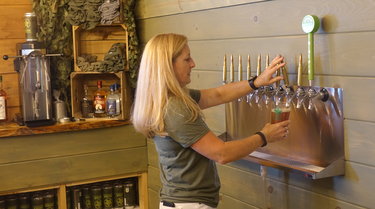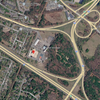Allied Brewing spikes its beer with WWII history
ALTAMONT — You’d be forgiven for thinking that Darci Efaw, the owner of Allied Brewing Company, or her husband, Kevin, come from a military background, given how strongly that theme plays into her business.
Most of the beers that Allied has developed — with help from a part-time brewer — get their name from some aspect of World War II.
For instance: the Little Boy Lager, after one of the atom bombs; Patton’s Pale Ale, as in the famed general George S.; and the USS Tang Belgian Dubbel, after what was apparently the war’s most successful American submarine.
The decor of their small tasting room, nestled within Altamont Orchards, in what used to be a storage area there, follows suit. There’s a copy of the Japanese Instrument of Surrender on the wall just beneath a 13-fold flag, and the handles of the tap take the shape of ammo rounds.
It’s to the point that the machine behind the counter that’s used to make crowlers (32-ounce to-go cans) on the spot for customers stands out for its lack of any military overtone.
But while the Efaws each have family members who served during World War II — Kevin’s grandfather served under Patton in the 2nd Armored Division and saw action in the Battle of the Bulge and Operation Overlord — and are close with many members of the local VFW, the couple themselves have no formal ties to the armed forces, they told The Enterprise this week.
“It just seemed like a good way to remind people what all those people did for us,” Darci explained.
Fittingly, Allied opened this year in time for Memorial Day Weekend, three years after the once-amateur homebrewers decided to devise a business. Darci said that much of those three years was spent slogging through bureaucratic obligations.
“As soon as you think you’ve got everything you need, there’s one more certificate or license or something that you need,” she said.
And it’s made all the more complicated by the fact that Allied Brewing shares space with Altamont Orchards, meaning there are certain restrictions on how staff and customers can move around.
A door that connects the Allied tasting room to the Orchards’ indoor market, which in turn leads to the brewery itself, Kevin explained, would be enormously convenient to use, but instead it’s only allowed to be an emergency exit, and anyone headed to the market or brewery has to leave through the main door and take the long way around.
“There’s so many different little hiccups,” he said.
From regulations to equipment, it’s a different ballgame than playing around with recipes at home, but the couple said they’ve had help along the way, including from the local brewing community, which comprises businesses like Mixed Breed and Indian Ladder Farms.
“Everybody knows everybody and everybody’s friendly,” Darci said, noting that there’s no competitive atmosphere, in part because of the culture of brewery-hopping, where people tend to visit a string of operations rather than settle on a favorite. “... [We’re] working together to make this area a destination for people that want to do that and see all the different places.”
What sets Allied apart is that it’s known as a New York State Farm brewery, meaning that it sources heavily from within the state, Kevin said.
“We have to use at least [60] percent New York grains, we have to use New York hops. The only product that we’re able to serve, aside from our own beer … is New York-based ciders, New York-based wines, New York-based spirits,” he said.
That 60-percent standard was set to increase to 90 percent under New York State Law by 2024, but Governor Kathy Hochul signed a bill late last month that delays that increase until 2028.
At the moment, Allied makes only its own beer, but the Efaws have been experimenting with cider at home, using apples from the 200 apple trees that the Efaws bought from the Abbruzzese family, who own Altamont Orchards. They’ve had some hits, but scaling it up would be complicated.
“The process is harder but easier,” Kevin explained. “You don’t have to cook it, you don’t have to put as much intention into temperatures and stuff like that as you do with a beer. But you have to grind up the apples, press the apples, and discard all of that … We don’t have a way to grind them and press them in bulk.”
But Darci’s license would allow Allied to start that up, if they want, unlike someone with a brewer’s license, which doesn’t provide that latitude, so it’s something that’s being considered, they said.
“We’ve got a lot of hopes for down the road,” Darci said.



